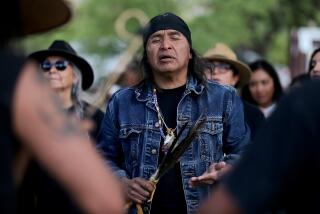Court Supports Alaska Tribes on Fishing : Law Restricting Rights in Favor of Commercial Fishers Rejected
- Share via
In a major decision on fishing rights in Alaska, a federal appeals court Monday struck down a state law that would have limited fishing rights of Aleuts, Eskimos and native Indians in favor of commercial and sports fishing interests.
The unanimous decision by a three-judge panel of the U.S. 9th Circuit Court of Appeals ruled that Alaska state officials were wrong in redefining the word “rural” to restrict the fishing rights of native groups who prefer to live on what they catch.
“The state has attempted to take away what Congress has given, adopting a creative redefinition of the word ‘rural,’ a redefinition whose transparent purpose is to protect commercial and sports fishing interests,” the ruling said.
The federal law, the Alaska National Interest Lands Conservation Act, gives priority to subsistence fishing by Alaska native groups over all other groups in rural areas, the judges said.
The decision, which may affect thousands of native villages throughout Alaska, caught many by surprise because two of the circuit judges involved in the opinion--Alex Kozinski and John T. Noonan Jr.--are considered staunch conservatives that civil-rights activists thought might not be sympathetic to arguments favoring native Alaskans.
Also, the case attracted little public attention last year when U.S. District Judge H. Russel Holland of Anchorage upheld the state’s position.
“This will make the state bureaucracy wake up and take notice that native peoples in Alaska do have rights,” said one civil-rights activist who asked that his name not be used.
State officials had no comment on the ruling.
The ruling came on a lawsuit filed in 1986 by the 750-member Kenaitze Indian tribe, which has lived for hundreds of years on the 9,000-square-mile Kenai Peninsula, located about 185 miles south of Anchorage, Alaska’s largest city.
The tribe argued that the state’s redefinition was so restrictive that most of its members could not even catch the new daily quota of salmon--six--that was allowed under the new definition adopted in 1986.
“It got to the point where we just stopped eating fish,” said tribe executive director Darlene Romer. “Salmon in the stores here is $5 a pound and that’s more expensive than most of our people can afford.
“We just prefer to continue our traditional ways and it’s clear the commercial and sports fishing people have more impact than we do (with state officials). So, we’re very happy with the decision.”
State officials had argued that despite the distance from Anchorage, the peninsula’s rural setting was changing due to the urbanization that crept south. An oil boom in the area in the last 20 years prompted the population to grow steadily to about 40,000.
Also, tribal members grew less reliant on subsistence fishing, officials argued.
Using a number of criteria--the per-capita catch of fish, the seasonal cycle of economic activity and the cost of goods and services, among others--the state ruled that the Kenai Peninsula was no longer rural in nature and altered the Indian tribe’s fishing rights.
But in the opinion written by Kozinski, the three judges rejected the state’s arguments.
“Congress did not limit the benefits of the (conservation act) statute to residents of areas dominated by a subsistence economy,” the opinion said. “To accept the state’s contorted definition of rural would materially change the sweep of the statute, second-guessing the congressional policy judgment embodied in ANILCA.
“This we may not do.”
The Kenaitze tribe is part of the Dena’ina Athabascan Indian group and are descendants of Indians who replaced the area’s original Eskimo inhabitants sometime between AD 500 and AD 1500, Alaskan historians said.
More to Read
Sign up for Essential California
The most important California stories and recommendations in your inbox every morning.
You may occasionally receive promotional content from the Los Angeles Times.










